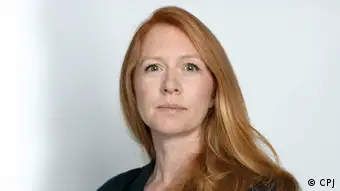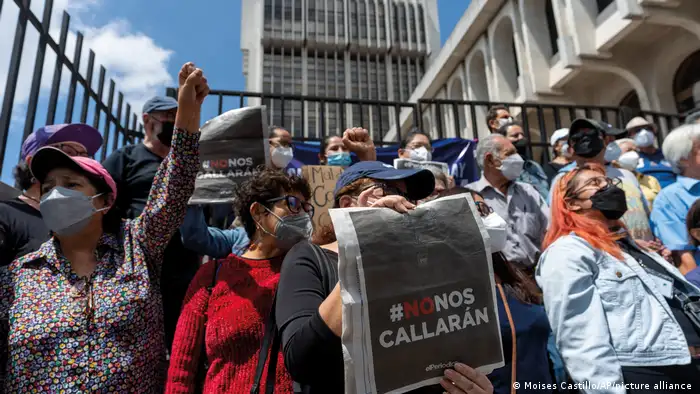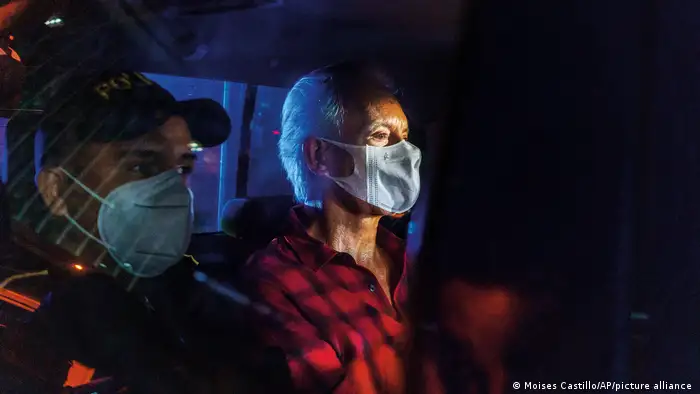Press
Weaponizing the law to silence journalists
A record 363 journalists were in jail around the world in 2022, the highest number the Committee to Protect Journalists has tracked in the 30 years. A new trend has also emerged to silence reporters: the abuse of law.
It has never been a more dangerous time to be a journalist. In 2022, the Committee to Protect Journalists (CPJ) documented 67 killings of journalists and media workers, with more than half those deaths taking place outside of war zones. Most of these journalists were murdered in direct reprisal for their reporting. Across the world, a record 363 journalists were in jail: the highest number ever recorded by CPJ in our 30 years of gathering such data. With social unrest from Peru to China and protests from Germany to the United States, journalists were threatened with violence and their equipment destroyed. Online, reporters were harassed, with women in particular facing a deluge of vile abuse, including threats of death and rape.
Against this backdrop, another disturbing trend was emerging under the radar, one just as potent as the violence used to silence reporters: the abuse of law.
Known as “lawfare”, this misuse of the law typically involves charges not directly related to journalism and is an increasingly common tool among corrupt and authoritarian regimes keen to silence journalists. Instead of being targeted for the words published or spoken, journalists, publishers and editors are pursued on supposedly unrelated charges, such as financial wrongdoing.
And while press freedom advocates have grown used to the misuse of national security laws to go after journalists, allegations of financial misdeeds are more difficult and complicated to challenge because such allegations ostensibly bear no link to the material being published. They are thus an effective means for repressive governments to mask penalties against critical reporting.
Financial charges brought against the press are an especially insidious tactic, designed to muddy the waters and sow confusion and doubt among the broader public about a journalist’s honesty. Governments seeking to silence independent reporting frequently use a strategy of smears suggesting journalists are akin to criminals: if the journalist is charged with a financial crime, this "proves" they are untrustworthy.

Jodie Ginsberg is the president of the Committee to Protect Journalists (CPJ), an independent nonprofit orgranization that works to safeguard press freedom worldwide.
As Maria Ressa, the Nobel peace prize laureate and founder of the Philippine news outlet Rappler told NPR: "These narratives of journalist-equals-criminal… set the stage for the filing of legal charges against us." Ressa, for years subject to an orchestrated disinformation campaign against her and her organization, was charged in November 2018 with tax evasion and failure to file tax returns. Although a court acquitted Ressa and Rappler of four of the five charges in 2023, a number of other cases against her remain—all of which she and media freedom groups around the world believe to be politically motivated.
While Ressa's case is among the best known, it is far from being unique. Such tactics are currently being deployed against a number of individuals and media outlets across the globe. In August 2022, José Rubén Zamora was arrested on accusations of money-laundering, blackmail and influence peddling. The 66-year-old journalist and editor, founder of Guatemalan El Periódico newspaper, has faced more than three decades of harassment, kidnapping and death threats, for his work detailing corruption at the highest levels of government. In 1995, Zamora's car was driven off the road by two men threatening to kill him. In 2003, he and his family were held hostage at gunpoint.
But this latest, legal threat is perhaps the most insidious of all, according to Rubén Zamora's son, José Zamora. He told CPJ: "Even though we have been prepared for an assassination, which is terrible, but it's something that we are constantly aware of and prepared for. This is completely different, because an assassination at least it gives you certainty."
Thousands of miles away in Hong Kong, 75-year-old media entrepreneur Jimmy Lai, founder of Apple Daily, is also in jail. Lai, a dual Hong Kong and British national, has been convicted on various charges, including fraud. He is currently awaiting trial on national security charges for which he faces life imprisonment.
Such judicial harassment of journalists affects not just the individual. It is designed to shutter organizations themselves. El Periódico was forced to halt print publication in December 2022 after the government withdrew advertising and allegedly pressured other advertisers to do the same. Apple Daily, which operated from 1995 to 2021 and was among Hong Kong's best-selling Chinese language newspapers, was forced to close after authorities froze the company’s assets. Rappler continues to operate despite a shutdown order from the Philippines' Securities and Exchange Commission, which said in 2022 it had found Rappler’s funding model to be "unconstitutional."
Others weaponize the law —or threaten to use it—by tying journalists up in expensive litigation. Known as SLAPPs (Strategic Lawsuits Against Public Participation), these are abusive lawsuits filed by powerful officials, businesspeople, or corporations against individuals, including critical journalists or news outlets, to restrict or censor critical reporting. SLAPPS are characterized by long and costly legal proceedings that aim to deter journalists from pursuing their reporting.

Journalists gather outside a court in protest against the detention of journalist José Rubén Zamora.
The Organized Crime and Corruption Reporting Project (OCCRP) reported in November 2022 that journalists and media outlets in its global network were battling a record 41 lawsuits filed by the subjects of their investigations. At a time when news outlets are under increasing financial pressure, such lawsuits are simply an unbearable burden for many.
"Getting sued is a David-and-Goliath scenario for most journalists," OCCRP said in its announcement of a new fund to help media outlets defend against SLAPPS. "The wealthy, powerful, and corrupt have endless pots of money, amounts of time, and access to lawyers specifically trained in targeting journalists to try to cripple and stifle them. OCCRP partner journalists, on the other hand, are typically from small, scrappy nonprofit outlets who have limited resources and must take valuable time away from their work to focus on their defense, while paying for expensive attorneys and court costs."
Stevan Dojčinović, the editor in chief of KRIK, a Serbian media outlet that focuses on crime and corruption and is battling 11 lawsuits said he was facing more SLAPP lawsuits than he had reporters. The costs are also significant. In 2021, the total value of actions against KRIK amounted to 765,000 Euros and one lawsuit demanded jail time for the journalist. The list of those suing KRIK's journalists and editors included a man charged with drug production, the head of the state security BIA agency, police chiefs, tycoons close to the government, people on Interpol wanted lists, a friend of President Aleksandar Vučić, a pro-government tabloid’s publisher and an international corporation.
Although journalists typically win frivolous lawsuits in jurisdictions with effective rule of law, the mental and financial burden of such suits typically makes any victory a pyrrhic one. Now journalists, media organizations and civil society groups are fighting back. OCCRP has launched the Reporters Shield—a legal defense fund to protect news organizations from harassing lawsuits, with an initial 9 million Dollars contribution from USAID.
Other organizations— including CPJ—are working to connect more reporters and news organizations to a wide array of legal support and expertise. The Legal Network for Journalists at Risk, a network of 15 organizations working on media freedom and legal support issues, aims to coordinate various types of support to help give those in need of assistance a single way to obtain help. An array of legal guides is meant to help journalists steer clear of legal troubles, where possible.
Like journalism, the law is a vital tool in the defense of democracy. Its abuse makes uncomfortable truths illegal and—in the process—diminishes us all.
- Date 23.05.2023
- Author Jodie Ginsberg
- Feedback: Send us your feedback.
- Print Print this page
- Permalink https://p.dw.com/p/4RUGA
- Date 23.05.2023
- Author Jodie Ginsberg
- Send us your feedback.
- Print Print this page
- Permalink https://p.dw.com/p/4RUGA


